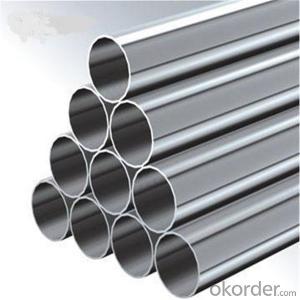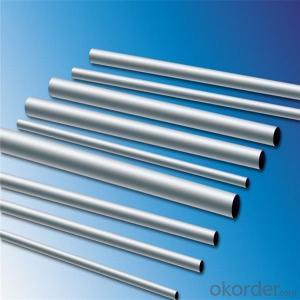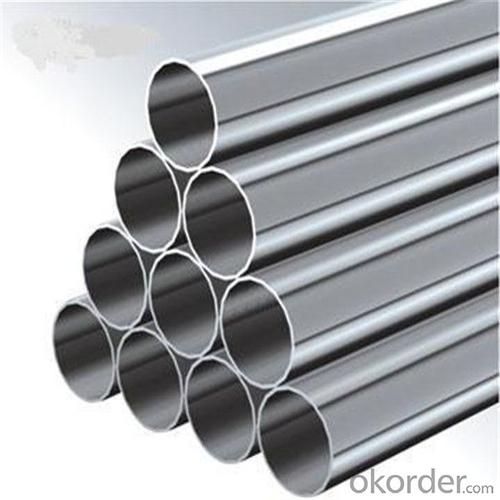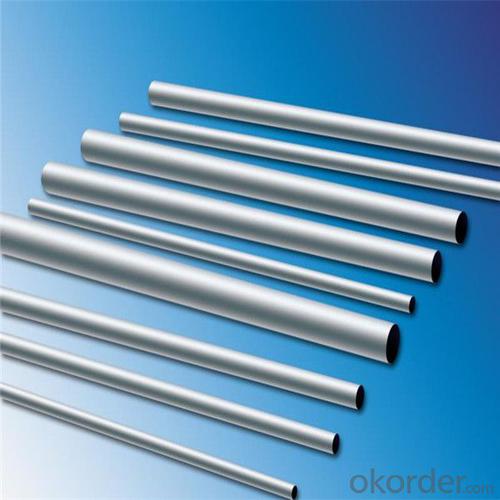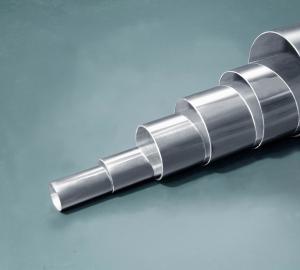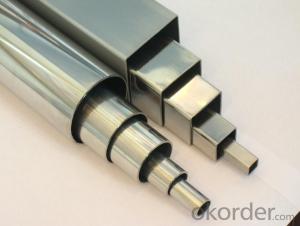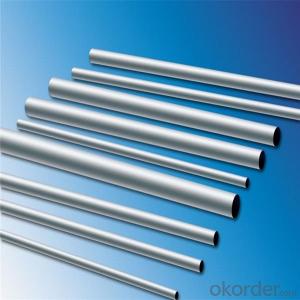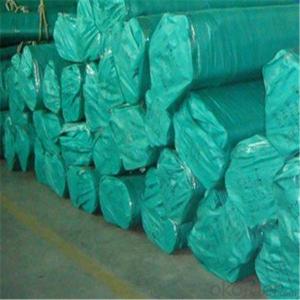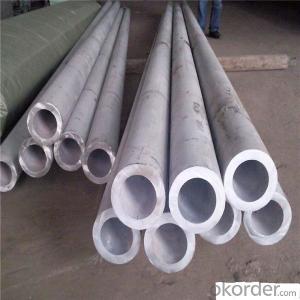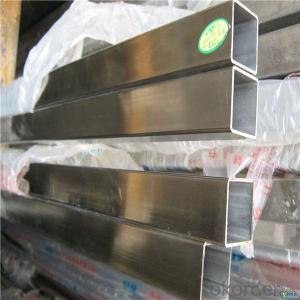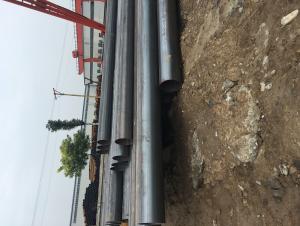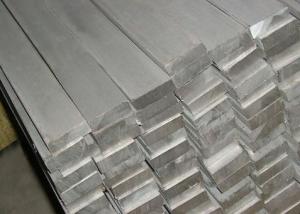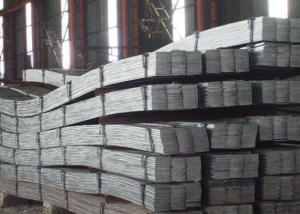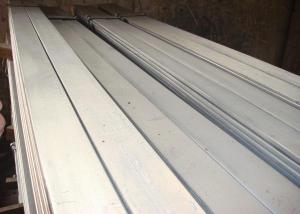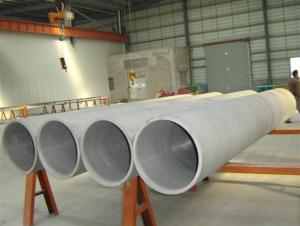316l Stainless Steel Seamless Pipe in Wuxi ,China
- Loading Port:
- Shanghai
- Payment Terms:
- TT OR LC
- Min Order Qty:
- 2 m.t.
- Supply Capability:
- 25000 m.t./month
OKorder Service Pledge
OKorder Financial Service
You Might Also Like
Specification
316 stainless steel pipe
Product Description
Name | Stainless Steel Seamless & Welded Tube &Pipe | |||||
Items | Square tubes, round tubes, oval pipes, special shaped pipes, empaistic pipes, fittings | |||||
Standard | ASTM A554, A249, A269 and A270 | |||||
Material Grade | 201: Ni 0.8%~1% | |||||
202: Ni 3.5%~4.5% | ||||||
304: Ni 8%, Cr 18% | ||||||
316: Ni 10%, Cr 18% | ||||||
316L: Ni10%~14% | ||||||
430: Cr16%~18% | ||||||
Outer Diameter | 9.53mm--159mm | |||||
Thickness | 0.3mm - 3.0mm | |||||
Length | 6m or as customers' request | |||||
Tolerance | a) Outer Diameter: +/- 0.2mm | |||||
b) Thickness: +/- 0.02mm | ||||||
c) Length: +/- 5mm | ||||||
Surface | 180G, 240G, 320G Satin / Hairline 400G, 600G Mirror finish | |||||
Application | handrail,railing, staircase, weldmesh screen,door,window, balcony,fence,bench,furniture,etc | |||||
Test | Squash test, extended test, water pressure test, crystal rot test, heat treatment, NDT | |||||
Chemical Composition of Material | Material
Composition | 201 | 202 | 304 | 316L | 430 |
C | ≤0.15 | ≤0.15 | ≤0.08 | ≤0.035 | ≤0.12 | |
Si | ≤1.00 | ≤1.00 | ≤1.00 | ≤1.00 | ≤1.00 | |
Mn | 5.5-7.5 | 7.5-10 | ≤2.00 | ≤2.00 | ≤1.00 | |
P | ≤0.06 | ≤0.06 | ≤0.045 | ≤0.045 | ≤0.040 | |
S | ≤0.03 | ≤0.03 | ≤0.030 | ≤0.030 | ≤0.030 | |
Cr | 13-15 | 14-17 | 18-20 | 16-18 | 16-18 | |
Ni | 0.7-1.1 | 3.5-4.5 | 8-10.5 | 10-14 | ||
Mo | 2.0-3.0 | |||||
Mechanical Property | Material Item | 201 | 202 | 304 | 316 | |
Tensile Strength | ≥535 | ≥520 | ≥520 | ≥520 | ||
Yield Strength | ≥245 | ≥205 | ≥205 | ≥205 | ||
Extension | ≥30% | ≥30% | ≥35% | ≥35% | ||
Hardness (HV) | <105 | <100 | <90 | <90 | ||
Definition of stainless steel(Adopted form Wikipedia)
In metallurgy, stainless steel, also known as inox steel or inox from French "inoxydable",
is defined as a steelalloy with a minimum of 10.5% to 11% chromium content by mass.
Stainless steel does not readily corrode, rust or stain with water as ordinary steel does,
but despite the name it is not fully stain-proof, most notably under low oxygen, high salinity,
or poor circulation environments. It is also called corrosion-resistant steel or CRES
when the alloy type and grade are not detailed, particularly in the aviation industry.
There are different grades and surface finishes of stainless steel to suit the environment
the alloy must endure. Stainless steel is used where both the properties of steel
and resistance to corrosion are required.
Surface Finish :
Surface finish | Characteristics and application |
No.2B | The surface brightness and flatness of no2B is better than no2D. then through a special surface treatment to improve its mechanical properties, No2B could nearly satisfy comprehensive uses. |
No.3 | Polished with abrasive belt of git#100-#200, have better brightness with discontinuous coarse stria, used as inner and external ornaments for building, electrical appliances and kitchen utensils etc. |
No.4 | Polished with abrasive belt of grit #150-#180,have better brightness with discontinuous coarse stria, but thinner than No3, are used as bathtub buildings inner and external ornaments electrical appliances kitchen utensils and food processing equipment etc. |
HL | Polished with abrasive belt of grit #150-#320 on the NO.4 finish and has continuous streaks, mainly used as buildings ornaments elevators, door of building, frontal plate etc. |
BA | Cold rolled, bright annealed and skin-passed, the product have excellent brightness and good reflexivity like mirror, kitchen apparatus, ornament etc. |
8K | The product have excellent brightness and prefer reflexivity can to be the mirror. |
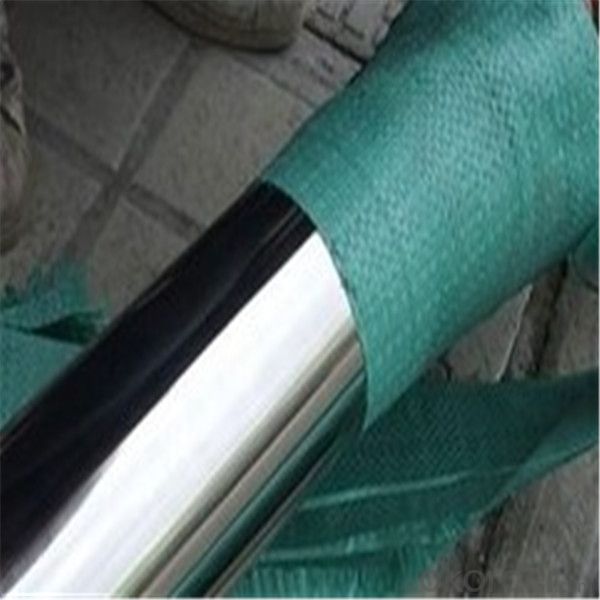
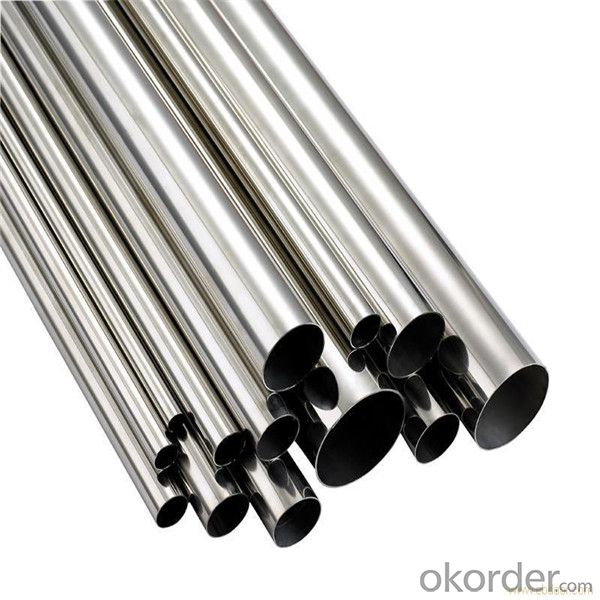
- Q: Are stainless steel pipes suitable for paper and pulp industry?
- Indeed, stainless steel pipes prove to be exceptionally well-suited for employment in the paper and pulp industry. This particular industry involves the manipulation of various chemicals that are corrosive in nature, as well as exposure to high temperatures and conditions of elevated pressure. Stainless steel pipes, with their remarkable resistance to corrosion, heat, and pressure, emerge as the ideal choice for this industry. The level of resistance displayed by stainless steel pipes against chemicals like chlorine dioxide and bleaching agents, along with other corrosive substances used in the paper and pulp industry, is notably high. This resistance guarantees that the pipes will not undergo corrosion or deterioration over time, thereby preventing leakage and ensuring the integrity of the entire piping system. Moreover, stainless steel pipes exhibit exceptional heat resistance, enabling them to withstand the high temperatures encountered during the paper and pulp production process. They can effortlessly accommodate both hot and cold liquids without experiencing any significant impact on their performance or structural integrity. Furthermore, the strength and durability of stainless steel pipes are commendable, rendering them capable of effectively managing the frequently encountered high-pressure conditions in the paper and pulp industry. These pipes can endure the force and stress exerted by the fluids being transported, thereby guaranteeing the dependability and longevity of the piping system. Additionally, stainless steel pipes are easy to clean and maintain, a crucial feature in industries where strict hygiene and sanitation requirements prevail, such as the paper and pulp industry. The smooth surface of these pipes impedes the accumulation of debris and contaminants, minimizing the risk of contamination and ensuring the overall quality of the final product. To conclude, the suitability of stainless steel pipes for the paper and pulp industry can be attributed to their resistance to corrosion, heat, and pressure. These pipes offer a resilient, dependable, and hygienic piping solution, making them an excellent choice for this particular industry.
- Q: What is the difference between seamless and welded stainless steel pipes?
- The main difference between seamless and welded stainless steel pipes lies in their manufacturing process and the resulting characteristics of the pipes. Seamless stainless steel pipes are produced by piercing a solid billet or ingot, heating it to a high temperature, and then rolling it into a hollow cylindrical shape. This process ensures that there are no seams or joints in the pipe, resulting in a smooth and uniform surface. Seamless pipes are generally considered to have higher strength and better corrosion resistance compared to welded pipes. They are also preferred in applications where high pressure or temperature is involved, as their seamless nature makes them more reliable and less prone to leaks. On the other hand, welded stainless steel pipes are manufactured by joining two or more pieces of steel together using various welding techniques. This process introduces a seam or weld line along the length of the pipe. Welded pipes can be produced in a continuous or intermittent welding process, depending on the required specifications. While welded pipes may have slightly lower strength and corrosion resistance compared to seamless pipes, advancements in welding technology have significantly improved their quality and performance. Welded pipes are generally more cost-effective and commonly used in applications where lower pressure or temperature is involved. In summary, the difference between seamless and welded stainless steel pipes lies in their manufacturing process and resulting characteristics. Seamless pipes, with no seams or joints, offer higher strength, better corrosion resistance, and are preferred in high-pressure or temperature applications. Welded pipes, with welded seams, are more cost-effective, commonly used in lower-pressure or temperature applications, and have seen significant improvements in quality and performance. Ultimately, the choice between seamless and welded pipes depends on the specific requirements of the application and cost considerations.
- Q: Can stainless steel pipes be used for transportation of hazardous materials?
- Yes, stainless steel pipes can be used for the transportation of hazardous materials. Stainless steel is known for its excellent corrosion resistance and durability, making it suitable for safely containing and transporting various hazardous substances. Additionally, stainless steel pipes can withstand high temperatures and pressures, providing further reliability for transporting dangerous materials.
- Q: Can stainless steel pipes be used for agricultural irrigation systems?
- Yes, stainless steel pipes can be used for agricultural irrigation systems. Stainless steel is a highly durable and corrosion-resistant material, making it suitable for various applications, including agricultural irrigation. It is known for its resistance to rust and corrosion, even when exposed to moisture, chemicals, and fertilizers commonly used in irrigation systems. Additionally, stainless steel pipes can withstand high-pressure water flow, making them ideal for delivering water to crops efficiently. Moreover, stainless steel is environmentally friendly as it is 100% recyclable, making it a sustainable choice for agricultural irrigation systems.
- Q: Can stainless steel pipes be used in pharmaceutical industries?
- Yes, stainless steel pipes can be used in pharmaceutical industries. Stainless steel is highly resistant to corrosion, easy to clean, and does not react with most chemicals, making it a suitable material for pharmaceutical applications where hygiene and product purity are crucial.
- Q: Can stainless steel pipes be bent or shaped?
- Yes, stainless steel pipes can be bent or shaped using various methods such as cold bending, hot bending, and tube bending machines.
- Q: How do stainless steel pipes compare to copper nickel pipes?
- Various industries commonly utilize stainless steel pipes and copper nickel pipes due to their unique properties and advantages. Although their purposes are similar, there are notable distinctions between the two. To begin, stainless steel pipes consist of an alloy primarily composed of iron, with substantial amounts of chromium and other elements. They exhibit exceptional resistance to corrosion, making them suitable for applications that prioritize durability and longevity. Additionally, stainless steel pipes possess considerable strength, rendering them ideal for high-pressure environments. Furthermore, they can withstand extreme temperatures, making them suitable for a wide array of applications. On the other hand, copper nickel pipes are comprised of an alloy that combines varying proportions of copper and nickel. These pipes possess high resistance to corrosion, particularly in seawater environments, which makes them highly useful in marine applications. Furthermore, copper nickel pipes exhibit excellent thermal conductivity and resist biofouling, making them suitable for heat exchangers and condensers in diverse industries. Regarding cost, stainless steel pipes generally offer a more affordable option compared to copper nickel pipes. The price difference can significantly impact decisions involving large-scale installations or projects with budget constraints. Furthermore, the selection between stainless steel and copper nickel pipes depends on specific requirements and conditions. For instance, if corrosion resistance is the primary concern, copper nickel pipes would be the preferred choice, especially in marine environments. Conversely, if strength, durability, and versatility are paramount, stainless steel pipes would be the superior option. In conclusion, stainless steel pipes and copper nickel pipes each possess distinct advantages and applications. Both materials are excellent choices for various industries, but the ultimate decision relies on factors such as corrosion resistance, strength, thermal conductivity, and budget considerations.
- Q: What is the difference between the stainless steel pipe welded pipe and seamless pipe?
- Strength: the strength of the pipeline in the composition of the alloy and alloy containing the same and the same heat treatment of seamless tube and seamed tube essentially consistent strength. After the tensile test and three-dimensional vibration test, tube tearing almost all occurred in the welding point or away from the heated area where. This is because there is little impurity in the weld and the nitrogen content is slightly higher, so the strength of the welded joint is better than that of other parts. However, the ASME Boiler and Pressure Vessel Association believes that the seamed tube can withstand 85% of the allowable pressure, which is mainly due to improved welding equipment data collection prior to today. The provisions of ASME 100% completely under license by ultrasonic testing pressure tube. Similarly, Europe and Asia also stipulates that can ensure the quality of welding performance by eddy current test tube, the eddy current testing is subject to legal procedures and licensed institutions. Trent's eddy current test was approved by the Swedish power division. ASME believes the current loss is relatively small, high-quality performance based on the seamed tube.
- Q: Can stainless steel pipes be used for chemical processing applications?
- Yes, stainless steel pipes can be used for chemical processing applications. Stainless steel is highly resistant to corrosion and can withstand a wide range of chemicals and temperatures, making it an ideal choice for chemical processing industries. Its durability, strength, and ability to maintain product purity make stainless steel pipes suitable for various chemical processes such as manufacturing, transportation, and storage of chemicals.
- Q: Can stainless steel pipes be insulated with ceramic?
- Yes, stainless steel pipes can be insulated with ceramic. Ceramic insulation is often used due to its excellent thermal resistance and insulation properties. It helps in reducing heat loss and conserving energy in various applications, including stainless steel pipes.
Send your message to us
316l Stainless Steel Seamless Pipe in Wuxi ,China
- Loading Port:
- Shanghai
- Payment Terms:
- TT OR LC
- Min Order Qty:
- 2 m.t.
- Supply Capability:
- 25000 m.t./month
OKorder Service Pledge
OKorder Financial Service
Similar products
Hot products
Hot Searches
Related keywords
